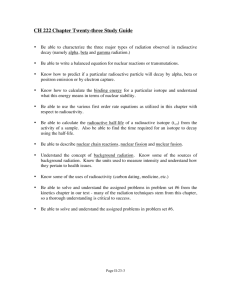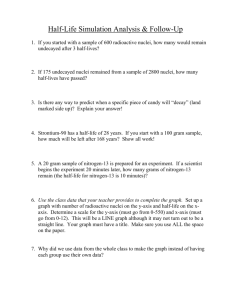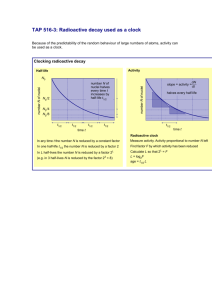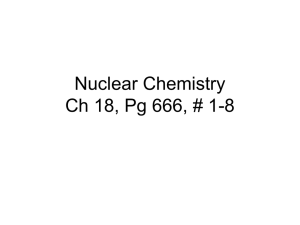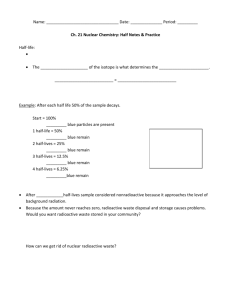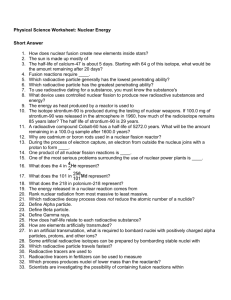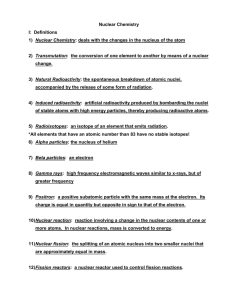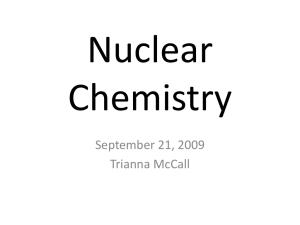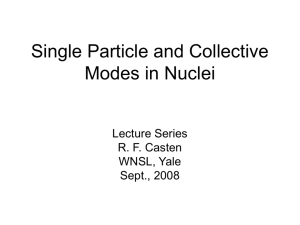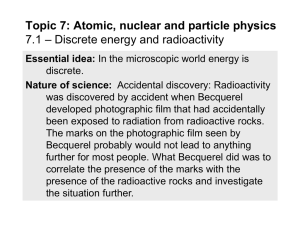5. Nuclear Chemistry
advertisement
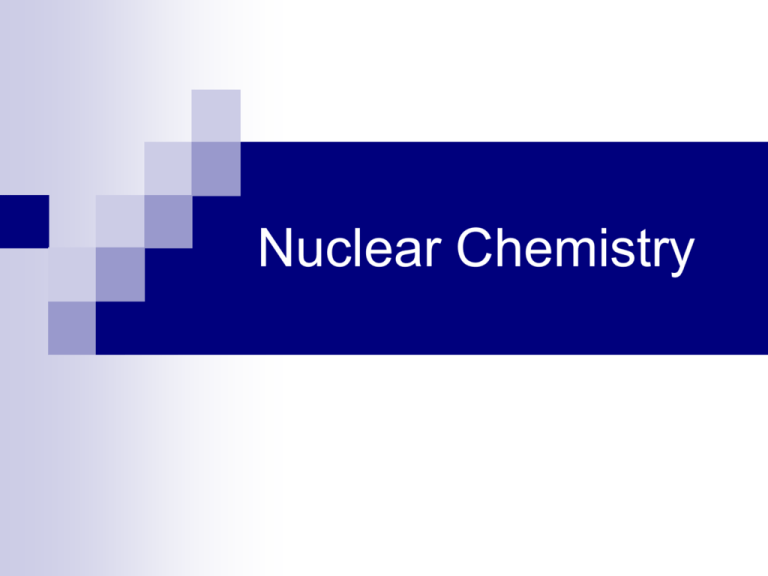
Nuclear Chemistry Natural Radioactivity The spontaneous breakdown of atomic nuclei, accompanied by the release of some form of radiation Transmutation: the conversion of one element to another by means of a nuclear change To detect Radioactivity one could use Geiger Counter Types of Radioactive Emissions All differ in mass, size and charge Reference Table O Alpha Particle: 2 positive 2 charge helium nucleus mass of 4amu Ex: 22688Ra 22286Rn + 4 4 2He Particle: 0-1 negative charge acts like a high speed electron no mass Example: 23592U 23593Np + 0-1 Beta Gamma Radiation (NOT a Particle) no charge acts like a high speed x-ray but with a lot more energy no mass Positron Particle: 0+1 positive 1 charge acts like positive electrons no mass Charge Relative Penetrating Power Particle Symbol Mass Alpha 4 2 4amu +2 Low Beta 0 -1 0 -1 Moderate Gamma 0 0 0 0 High Positron 0 +1 0 +1 Moderate Separation of Radioactive emissions by charge: Positively Charged Plate + + + + Negatively Charged Plate - Half-Life The time it takes for half of the atoms in a given sample of an element to decay. Some selected half-lives are found on Table N All reactions on Table N are Natural Transmutation Formulas for half-life reactions are found on Table T Artificial Radioactivity Artificial Transmutation: artificial radioactivity produced by bombarding the nuclei of stable atoms with high energy particles, thereby producing radioactive atoms Fission Reactions The splitting of an atomic nucleus into two smaller nuclei by bombardment of a neutron (Nuclear Bomb). *Nuclear Reactors are fission reactors. Example: 23592U + 10n + 3(10n) + Energy 142 191 Kr Ba + 56 36 Fusion Reactions A nuclear reaction in which two or more light nuclei combine to form a single nucleus. Requires huge amounts of pressure and extremely high temperatures. Produces much more energy than fission. Occurs naturally on the sun. (Hbomb) Example: 2 2 H H + 1 1 4 2He + Energy Uses of Radioactive Isotopes Lab: To trace chemical reactions. Industry: Radiating food to preserve by killing bacteria, mold, insect eggs. Medicine Must have relatively short halflives and be quickly eliminated from the body. I-131 diagnosing and treating Thyroid conditions (half-life 8.07 days) Co-60 emits large amounts of gamma radiation as it decays, these rays can be aimed at cancerous tumors (half-life 5.26 years) Ra-226 used in treatment of certain cancers (half-life 1600 years) Tc-99 used in diagnosis of brain tumors (half-life 2.13x105 years Geology Fossils C-14 to C-12 ratio (while alive they are in equal amounts, once an organism dies C-14 is no longer taken in). Rocks U-238 to Pb-206 ratio (U-238 decays through a series of steps until it forms stable Pb-206. As time passes, the amount of U-238 decreases while the amount of Pb-206 increases). Balancing Nuclear Equations Steps for Balancing: Due to the Law of the Conservation of Matter, whatever is on the left side of the equation must also be on the right side of the equation. Add the mass numbers on the left side of the equation, this MUST equal the total mass numbers of the right side of the equation. Add the atomic numbers on the left side of the equation, this MUST equal the total atomic numbers on the right side of the equation. Example: 32 1 n S + 16 0 1 32 P H + 1 15
